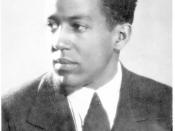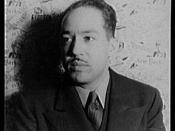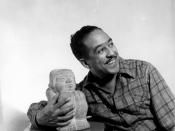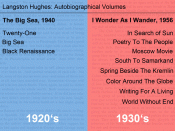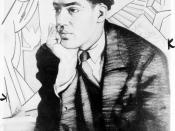Compare and Contrast Since the beginning of his life, Langston Hughes, knew that he was going to be something. His contribution to the Harlem renaissance will not be forgotten. Nor will the way he uses jazz, blues, and gospel music to revel in how far blacks have really come. I will compare and contrast two of his most popular works, ?Let America Be America Again? and ?Harlem?. To understand the compare and contrast you must first have a brief, yet detailed explanation of both of the works. Let us first approach ?Let America Be America Again?, Hughes tone is probably the first issue addressed. His tone has an understood wisdom that America was free for those who weren?t black. Although it has a kind of whiny tone, it isn?t. Hughes has been beaten down, but the fact that he is a survivor means that he won?t give up.
He starts off in line 2 stating that America was created for the sole purpose of freedom. He also implies in line 3 and 4 that our country was founded for the sole purpose of freedom. In fact and I quote, ?Let it be the pioneer on the plain Seeking a home where he himself is free?. Hughes was a man of many talents and one of them was his perceptiveness. A perfect example is in stanza 25, where he states, ?Of dog eat dog, of mighty crush the weak?. In essence he said its kill or be killed, survival of the fittest. You would think that everyone would agree, but then again a lot of common sense has been lost. Or simply the fact that America is apathetic and cares only for one person, themselves. He then goes on to describe that he is, or our race is, poor and uneducated, etc? But the simple fact remains that we may be beaten down, but we are far from dead (he now is speaking of every race that is or has been persecuted in America). In stanza 60 the most basic and one of the most important of human emotions shines through Hughes. ?America never was America to me, And yet I swear this oath-America will be!? What is the most basic instinct, survival of course.
Now let us approach, ?Harlem? which is one of my personal favorites because of its realism. Written nearly a decade later and in a completely different tone this poem can baffle readers who aren?t used to Hughes use of conventional wisdom. This poem has eleven, quick to the point, short lines. Each one asks a different question, to understand it we will break it down into five different questions. The first is ?What happens to a dream deferred?? This question has a variety of different answers depending on the person. Since it is written for everyone to enjoy or not, the answer must be whatever you think. In other words there is no wrong answer or you could just play it safe and say that it is rhetorical. The second question is more descriptive because it partly answers the first question. Hughes asks and I quote, ?Does it dry up like a raisin in the sun?? The use of adjectives and the metaphor suggests that he is asking you the reader if that is how your dreams, of course the ones that don?t come true, die. The third question is more to my liking. He asks, ?Or fester like a sore-And then run?? This one is pretty obvious, he is merely asking if your dreams keep leading you on and then dump you at the last second. Hence fester (leading you on) and run (dump you at the last second). The fourth question is another rhetorical question, ?Does it stink like rotten meat? Or crust and sugar over-like a syrupy sweet?? Only the reader can answer that question since it depends on your own persona and so on. The last question is set apart from the rest. This is where he reaches his breaking point and comes out of the trance that so aptly named poetry. To understand this question you would have to ask the very man that wrote it.
Now we can compare and contrast ?Let America Be America Again? and ?Harlem?. First address the tones of both poems. In ?Let America Be America Again? His prose isn?t exactly bitter, but it?s not happy either. In Harlem it is completely the opposite, because it is written ten years after it is believable that something happened to him to change his tone and his way of writing. When he writes in ?Harlem? his use of adjectives is rather abrasive. As it seemed to me he was rather irritated anyways, so in a way it worked itself out. In the first three stanzas Hughes is celebrating the dream. He also identifies the dream with pioneers and with kings. But in ?Harlem? the dream is explosive and decrepit. The conceptual design in ?Let America Be America Again? is more or less acceptance. He accepts the fact that things are the way they are and strives to change it. However in ?Harlem? his concept sounds rather pessimistic. But that?s only to the untrained and ignorant, because despite the fact that his tone is dark doesn?t mean that he has given up on life. Perhaps he finally saw that the good doesn?t outweigh the bad. In ?Let America... his voice isn?t singular, but the unheard voices of all races who have been persecuted because of their skin color. In ?Harlem? its just one voice that seems to ask so many questions. Just like in ?Let America... he doesn?t allow himself to be limited by his questions.
In the end Langston Hughes was a man changed by time. The fact that ?Harlem? differs from ?Let America Be America Again? means that Hughes merely grew up. The use of realism in both poems helps convey the general idea of what happens in the real world when dreams are crushed.
